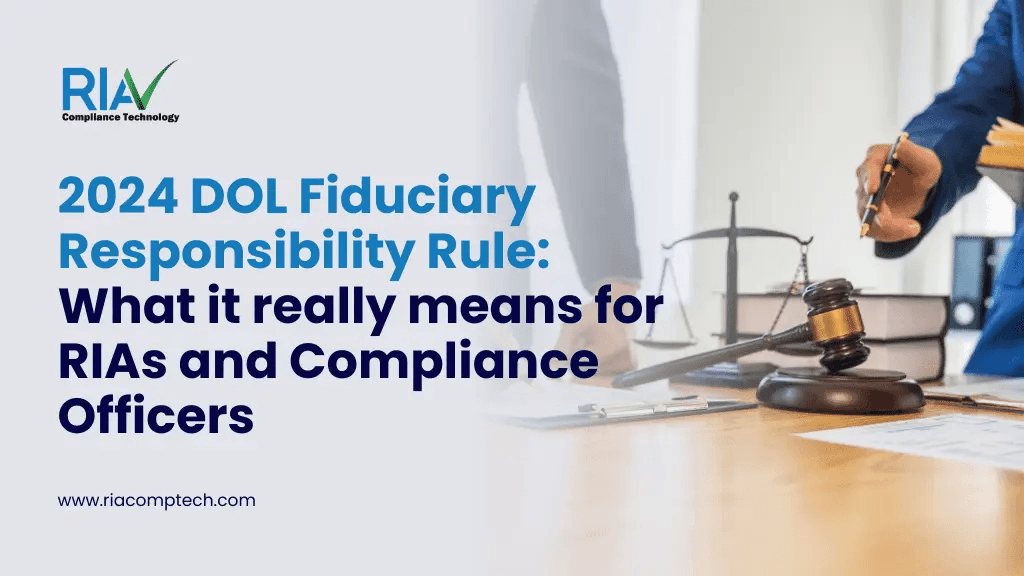2024 DOL Fiduciary Responsibility Rule: What it really means for RIAs and Compliance Officers
Blake Bjordahl
Compliance Technology Expert & RIA Consultant

By now, you've probably seen the words "New DOL Rules" all over your inbox, news headlines, and LinkedIn feed for the last month or so. That's because the Department of Labor did, in fact, release new fiduciary rules…
Unfortunately, there are about a million of them, they are hard to read, and they don't all come into play at one time…
One thing about RIA Compliance Technology is that we will make it simple. We read through these rules, took notes, and boiled them down for you.
Key Takeaways From the New DOL Rules
Simplified findings from the 2024 DOL Fiduciary Rule announcement as they relate to Registered Advisers and Compliance Officers:
- Essentially, The Final Rule expands the definition of who is considered a fiduciary based on recommendations made to retirement investors.
- The new rule goes into effect in 2 phases starting on September 23, 2024 and finalizes on September 23, 2025.
- There have been many challenges in the courts; we expect to have clarification on implementation over the next few months.
Tips for RIAs and Compliance Officers
To keep it simple, we recommend that you have a disclosure document that contains the following suggested language provided by the DOL:
To assist financial institutions and investment professionals in complying with this condition of the exemption, the exemption preamble includes the following model language that will satisfy the fiduciary acknowledgment requirement:
When we provide investment advice to you regarding your retirement plan account or individual retirement account, we are fiduciaries within the meaning of Title I of the Employee Retirement Income Security Act and/or the Internal Revenue Code, as applicable, which are laws governing retirement accounts. The way we make money creates some conflicts with your interests, so we operate under a special rule that requires us to act in your best interest and not put our interest ahead of yours.
Under this special rule's provisions, we must:
- Meet a professional standard of care when making investment recommendations (give prudent advice);
- Never put our financial interests ahead of yours when making recommendations (give loyal advice);
- Avoid misleading statements about conflicts of interest, fees, and investments;
- Follow policies and procedures designed to ensure that we give advice that is in your best interest;
- Charge no more than is reasonable for our services; and
- Give you basic information about conflicts of interest.
Provide this disclosure whenever you give rollover advice regarding whether to roll over retirement assets from an employer-sponsored plan (like a 401(k)) into an IRA or another retirement account and the specific investments within those accounts.
Educate your clients about their options when considering what to do with their 401(k) assets. For example, leave the assets with the firm, take a direct distribution, manage the money themselves, or work with you, the advisor. We also suggest including some educational consequences to each option.
Track your rollovers so you can conduct an annual review of your rollover business to ensure your recommendations are still appropriate for your clients.
- RIA Compliance Technology can provide you with a sample rollover form for your organization to use with clients.
- The Simple Compliance Portal has a built in DOL Tracker for users to easily log rollover transactions into their database.
- Using our new Compliance Matching service, we can connect you with a compliance consultant who will answer any questions you may have about the new DOL rule.
- We will continue to monitor the updates, new DOL Rules, legal battles, and new information to keep you updated as this process continues.
Schedule a call with our compliance experts to learn about our DOL Tracker and Rollover Form, built into the Simple Compliance Portal, and save yourself time in the future!
RIA Compliance Technology has a Simple Email Archive solution that prioritizes data security, in addition to providing simplified email processing and virus protection. We empower financial professionals to be proactive so they can focus on what they do best by providing simple, structured and organized solutions that meet and exceed demanding compliance standards.
Stop by our website to learn more about RIA Compliance Technology solutions and schedule a demonstration from our team of compliance experts, today.
Tags
Blake Bjordahl
Compliance Technology Expert & RIA Consultant
Blake specializes in helping RIAs implement cost-effective compliance solutions. With extensive experience in regulatory technology, he focuses on making compliance simple and automated for investment advisory firms.
Ready to Simplify Your Compliance Management?
Stop worrying about compliance tasks and start focusing on what matters most - your clients. Get organized with our compliance calendar solution.